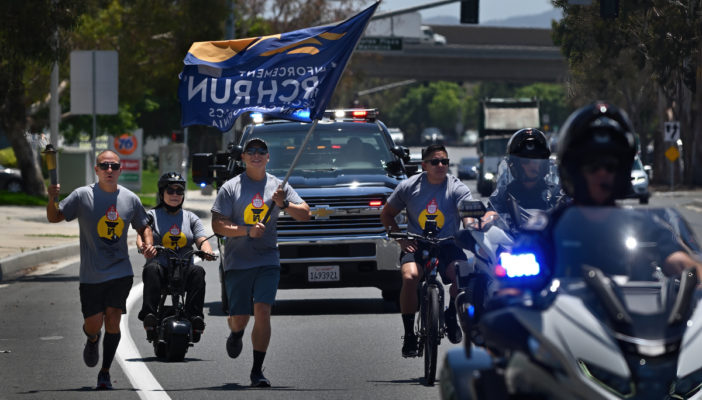The Flame of Hope, the torch carried by law enforcement and other officials in Orange County to benefit the Special Olympics, has returned after a two-year pandemic-induced hiatus.
The Flame of Hope was a welcome sight for local police and officials. It represents police getting back to giving back and maintaining positive relationships with their communities, not to mention supporting a worthy cause.
On a recent afternoon, the Tustin Police Department carried the torch forward during the Law Enforcement Torch Run. For four days, the torch made its way through Orange County, beginning in San Clemente and traversing a winding path up to Los Alamitos.
The Tustin Police Department took the torch from a group of about 20 runners from the Irvine Police Department. The exchange was quick: Captain Manny Arzate came up to meet Irvine’s lead runner, the two groups took a photo together, and then Tustin was off running down Edinger Avenue, where they would hand off the torch to the Santa Ana Police Department.
Tustin and Irvine Police Chiefs Stu Greenberg and Michael Kent, respectively, attended the swap between their teams.
The Law Enforcement Torch Run is a good way for neighboring agencies to interact. While events such as Baker to Vegas or other inter-department sports also provide connection, the Torch Run allows for a connection without competition. There are no bragging rights to be won. Rather, it is about what the Special Olympics Mission states: “continuing opportunities to develop physical fitness, demonstrate courage, experience joy and participate in a sharing of gifts, skills and friendship with their families, other Special Olympics athletes and the community.”

Runners and support staff of Tustin Police Department’s Law Enforcement Torch Run. From left, PSO John Garzone, Capt. Manny Arzate, Officer Tim Thai, Officer Merwin Caiza, PSO Zhanna Patterson, PSO Jennifer Dlugitch, Officer Ryan Newell, Police Records Specialist Catleya Silvestre-Sim, Officer Michael McJunkin, Sgt. Sarah Fetterling and Sgt. Don Houle.
Photo by Steven Georges/Behind the Badge
Arzate said seeing his fellow officers from neighboring communities is its own reward and added that it is nice to “see that we’re all connected.”
“This partnership is going on decades,” Kent said. “It’s great to see the departments come together. This is what it’s all about.”
Greenberg said that after the COVID-19 pandemic, “Everyone wants to get back to living life and doing things they enjoy. It’s a win for everybody.”

The Special Olympics torch used by the Tustin Police during the Law Enforcement Torch Run.
Photo by Steven Georges/Behind the Badge
Kent echoed the notion, saying it was nice to be able to get back to public interaction.
“It’s great to come out for a good cause and not just calls for service,” he said.
Greenberg noted that Tustin recently played host to a Chili Cook-off and had its best-ever turnout.
In past years, the local run culminated in Long Beach with the lighting of the flame for the Summer Games at California State University, Long Beach. With the Special Olympics USA Games moving to Orlando for the first time, this year’s run was held to coincide with the Florida Games.

Tustin Police Capt. Manny Arzate, left, runs with the torch as Officer Tim Thai caries the Law Enforcement Torch Run flag down Edinger Avenue. Officer Merwin Caiza rides along on a bicycle, right, while Police Records Specialist Catleya Silvestre-Sim is behind them on the scooter.
Photo by Steven Georges/Behind the Badge
The members of the Tustin contingent all said they were excited to be part of something bigger than themselves.
For Arzate, the event stretches well beyond law enforcement and the geography of the agencies.
“The torch run and people with disabilities affect all walks of life,” he said.
A 20-year veteran with the Tustin Police Department, Arzate said he tries to participate whenever he is able. He says he has been in about 10 runs and it never gets old.
“My most memorable times are just running and seeing the smiles on faces,” he said. “That’s the most rewarding part.”

The team poses for a photo before the start of Tustin Police Department’s Law Enforcement Torch Run. From left, Deputy Chief Robert Wright, PSO Zhanna Patterson, Officer Merwin Caiza, Officer Tim Thai, Capt. Manny Arzate, Police Records Specialist Catleya Silvestre-Sim and Police Chief Stu Greenberg.
Photo by Steven Georges/Behind the Badge
Catleya Silvestre-Sim, a records specialist, has been with the department for four years, but this was her first opportunity to participate.
“It’s like a family here,” she said. “I always wanted to be involved.”
Rather than run, Silvestre-Sim opted to hi-jack her 11-year-old son’s scooter.
Asked about running she said, “Maybe 30 years ago, yes. Now, no.”
Another first-timer was Officer Tim Thai. Although not much of a runner, he felt he could handle the three miles of the Tustin portion, although he admitted he had considered riding his electric bike.

Tustin Police Capt. Manny Arzate, left, and Officer Tim Thai run down Edinger Avenue during the Law Enforcement Torch Run.
Photo by Steven Georges/Behind the Badge
Thai, who transferred to Tustin for the L.A. County Sheriff’s Department six months ago, said he is loving his new agency and really enjoying getting to know the residents. Thai said he enjoys the community support and is happy to come out on his time off to participate in community events.
Officer Merwin Caiza, who is an avid cyclist, said he would have been riding his bike anyway on an off day, but this was much more rewarding. Caiza said, “I just want to participate in a good cause and be part of something larger than myself.”

Tustin police personal participating in the Law Enforcement Torch Run, from left, are Officer Merwin Caiza, PSO Zhanna Patterson, Capt. Manny Arzate, Officer Tim Thai and Police Records Specialist Catleya Silvestre-Sim.
Photo by Steven Georges/Behind the Badge
The Law Enforcement Torch Run has become an integral part of the Special Olympics experience in Southern California over the years. Typically, the event involves thousands of officers, volunteers, and athletes and raises more than $1 million for the Games.
The event was founded in 1981 by officers in Kansas and quickly spread nationally and internationally. The events have become ubiquitous in the run-up to the Games. According to the Law Enforcement Torch Run website, the runs and associated events have raised more than $900 million for the Special Olympics.
 Behind the Badge
Behind the Badge



